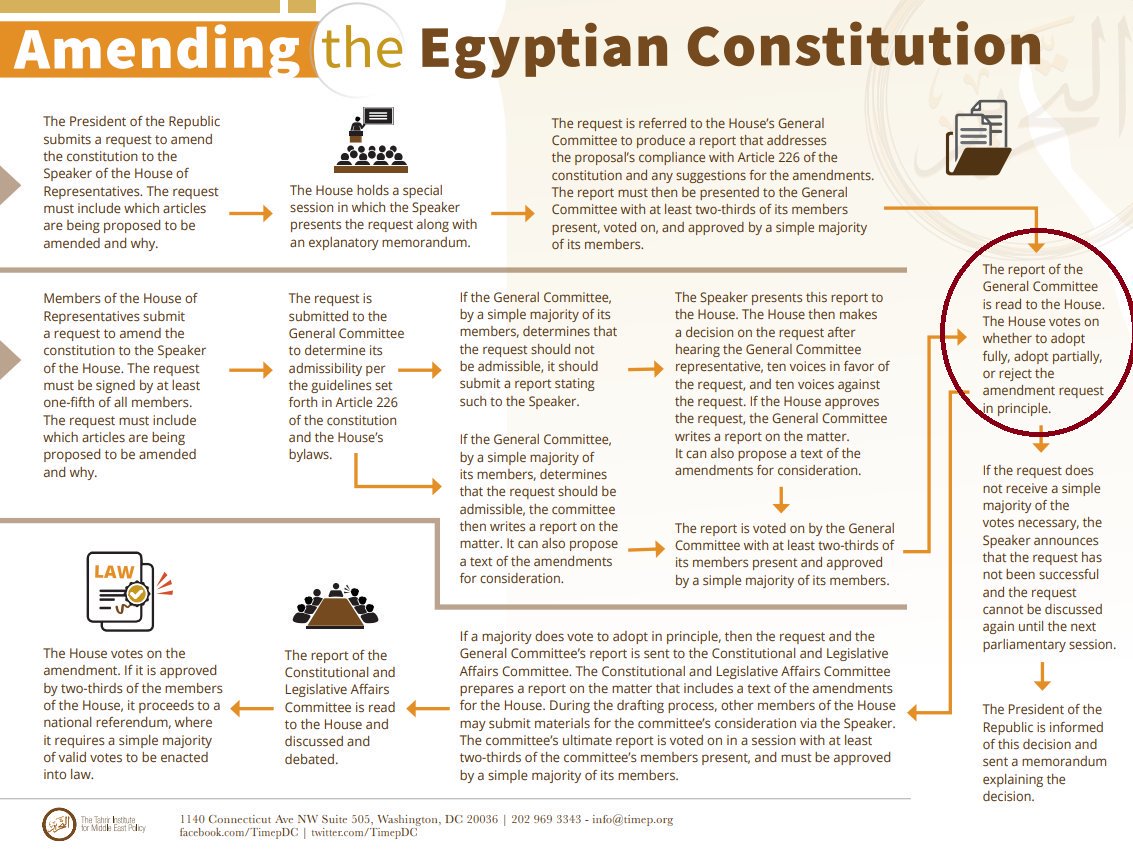For the past few days, there has been a lot of discussion and oppositions regarding Egypt’s new attempts to amend the 2014 constitution, particularly on whether President Sisi will indeed extend his term in office until 2034.
Summary:
On Thursday, Egypt’s House of Representatives voted by an overwhelming majority (485 out of 596) to approve a set of constitutional amendments that allow extending the presidential term from four to six years in Article 140 of the constitution, a transitional clause that applies only to President Sisi for him to run for two more six-year terms after his current term ends in 2022, re-introduce an upper house of Parliament and the Senate, a quota specifying at least 25 percent female representation in parliament, as well as an “appropriate representation” of young men, farmers, workers and Copts.
The amendments also give the president new authorities over appointing members of the judiciary and increase the army’s role in “safeguarding the constitution and the ideals of democracy, and maintaining a civil state.”
However, was this the final vote? As seen below in The Tahrir Institute for Middle East Policy’s (TIMEP) infograph, the amendment process includes a set of several stages, and the vote taken on Thursday is what is circled in red.
TIMEP’s infographic helps to better understand the process for amending the constitution as laid out by Articles 133 to 143 of the House of Representatives’ bylaws and Article 226 of the constitution.
In addition, it is also worthy to note that Article 226 states, “In all cases, texts pertaining to the reelection of the president of the republic or the principles of freedom and equality stipulated in this constitution may not be amended, unless the amendment brings more guarantees.”

The process:
In this case, members of the House of Representatives submitted a request earlier this month to amend the constitution to the Speaker of the House, which must be signed by at least one fifth of all members and include reasons for amendment.
After writing the report, the report of the General Committee is then read to the House and is voted on whether to adopt fully or partially or reject the amendment request in principle.
The next step from now is for the report to be sent to the Constitutional and Legislative Committee, which will will open the door to receive comments and proposals from institutions and citizens for one month and include any revisions to the draft.
After that, two weeks of dialogue sessions will be held with people from the judiciary, politics, higher education as well as trade unions and syndicates, and the drafting of the articles will occur for one week in order to prepare the report.
The final report will then be read to the House to be debated, which will finally vote on the amendment.
If approved by two-thirds of the members of the House, then it will proceed to a national referendum to be fully enacted into law.
Is there any opposition?
While the majority voted in favor of the amendments, there were still approximately 16 votes against, according to Mada Masr.
Earlier this month, Egyptian opposition parties have also reportedly formed a coalition against the proposed changes to the constitution that would allow President Abdel-Fattah El-Sisi for more than four years.
MP Ahmad Tantawi, who is a member of the largely oppositional 25/30 Alliance, stated that he “strongly” rejected the amendments, and deemed them “unconstitutional” and “a setback that is clearly tailored to suit a certain individual, whose name we won’t mention.”
In addition, public figures and members of the committee that drafted the 2014 Constitution launched a petition to oppose the amendments.
“The citizens of Egypt who sign this statement believe that the essence of the proposed constitutional amendment process is to enable the current president to continue ruling for more than two presidential terms, in violation of the current Constitution, concentrating all powers in his hand and tightening the executive power’s grip on all judicial bodies, which means eliminating any possibility of peaceful transfer of power and freezing the project to build a modern democratic civil state,” the petition says.
The petition now includes 200 signatories, with 10 political parties: the Egyptian Socialist Party, the Reform and Development Party, the Populist Socialist Alliance, the Dostour Party, the Karama Party, the Egyptian Democratic Party, the National Reconciliation Party, the Free Egypt Party, the Bread and Freedom Party and the General Congress Party.
Will the amendments be enacted?
Despite the fact that Sisi made public statements declaring that he would not seek to amend the constitution’s regulations on term limits nor seek a third term in office, according to some reports, there have been many attempts by some representatives to extend his term in office.
In December 2018, Mada Masr released an investigative report detailing secret meetings held between the General Intelligence Directorate and representatives from Sisi’s office to discuss amendments to the constitution.
However, the full picture is yet not clear, as there has been strong opposition outside the parliament regarding the amendments.
For instance, Amr Moussa, former foreign minister and Arab League chief who led the 50-person panel that drafted the constitution, called for a national dialogue on the proposed changes and that parliament’s hearings on the issue be broadcast in full.
A viral hashtag also spread on Egyptian social media “#لا_لتعديل_الدستور” (No to Amending the Constitution) in light of the news.






Comments (5)
[…] All You Need to Know About Egypt’s New Constitutional Amendments […]
[…] Source link […]